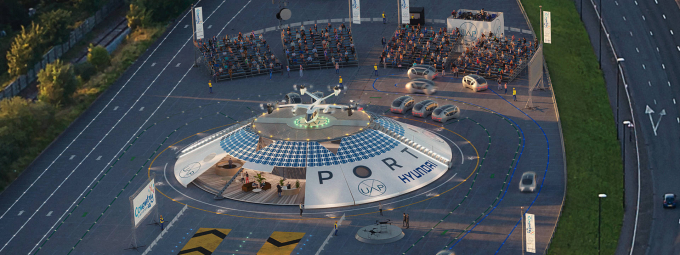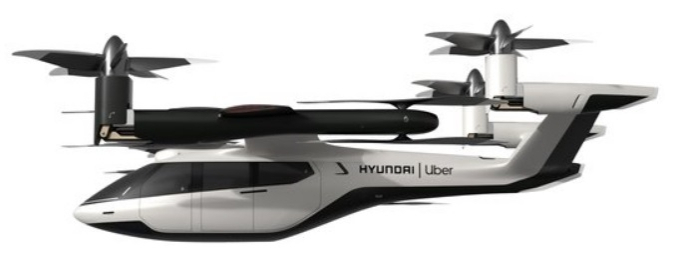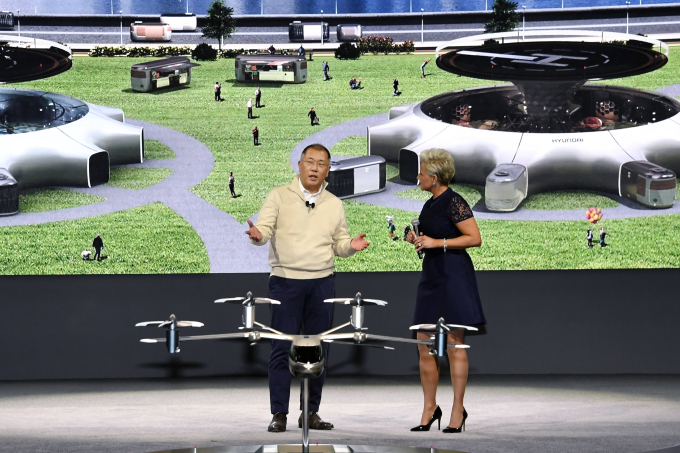Urban air mobility
Hyundai-partnered world-first urban airport project gets UK govt backing
By Jan 29, 2021 (Gmt+09:00)
2
Min read
Most Read
Samsung shifts to emergency mode with 6-day work week for executives


CJ CheilJedang to sell feed, livestock unit for $1.4 bn


Affinity to buy SK Rent-a-Car at $572 mn, more deals expected


Keppel REIT to sell Seoul-based prime office T Tower


Samsung Electronics' key M&A man returns; big deals in the offing



A British urban air mobility project, in which South KoreaŌĆÖs Hyundai Motor Co. is a technology partner, has been chosen as the winner of the UK governmentŌĆÖs ŌĆ£Future Flight Change,ŌĆØ aimed at developing aviation infrastructure and systems.
According to Hyundai on Jan. 29, the Air-One project will be awarded a ┬Ż1.2 million grant from the UK government. The program is funded by ┬Ż125 million from the Industrial Strategy Challenge Fund and is expected to be matched by up to ┬Ż175 million from the industry.
British mobility firm Urban-Air Port Ltd, which runs the project, plans to launch the worldŌĆÖs first fully operational hub for future electric urban aircraft in Coventry by November this year.
The move comes as global automakers and tech companies are competing to develop aviation infrastructure for electric vertical take-off and landing (eVTOL) aircraft such as autonomous cargo drones and air taxis.
The envisioned airport will be 60% smaller than a traditional heliport, according to the companies.

Pamela Cohn, chief operating officer for the urban air mobility (UAM) division of Hyundai Motor Group, said: ŌĆ£As we advance our eVTOL aircraft program, development of supporting infrastructure is imperative. Air-One is a unique project that is set to help lead the way in developing a robust, accessible and intermodal infrastructure network for future mobility.ŌĆØ
ŌĆ£We are excited to be part of this partnership in the UK and look forward to working together to create community impact and opportunity through safe, affordable, and human-centered mobility solutions.ŌĆØ
Hyundai Motor signed a memorandum of understanding with Urban-Air Port in August last year to push for the Air-One project, in which the Korean automaker will support infrastructure and operations design and development.
HYUNDAIŌĆÖS FUTURE GROWTH ENGINE
In November 2020, Hyundai Motor, Korea's largest automaker, said it plans to unveil unmanned cargo aircraft by 2026, as part of the automotive groupŌĆÖs long-term goal to shift its business portfolio toward urban air mobility (UAM), one of its key growth engines.
Unlike drones, HyundaiŌĆÖs unmanned aircraft system (UAS) for cargo transport will have wings as it will be designed to carry heavier payloads for commercial use, with vertical take-off and landing capabilities in an urban environment, it said.

Hyundai MotorŌĆÖs new Chairman Chung Euisun, who took the groupŌĆÖs leadership in October, has emphasized that the automaker will shift its business portfolio breakdown┬Āso automobiles account for half of its sales, followed by UAM with 30% and robotics at 20%.
During the 2020 US Consumer Electric Show, Hyundai unveiled its urban air mobility initiative, as well as showcasing its S-A1 air vehicle concept equipped with an eVTOL system.
Hyundai plans to invest $1.5 billion in UAM over the next five years to cultivate new business opportunities in future mobility.
Write to Sun A Lee at suna@hankyung.com
In-Soo Nam edited this article.
More to Read
-
 ESG bondsHyundai, Kia to raise $921 mn in green bonds for future mobility
ESG bondsHyundai, Kia to raise $921 mn in green bonds for future mobilityJan 11, 2021 (Gmt+09:00)
2 Min read -
 Future mobilityGS Caltex to showcase drone delivery, future gas stations at CES 2021
Future mobilityGS Caltex to showcase drone delivery, future gas stations at CES 2021Jan 07, 2021 (Gmt+09:00)
1 Min read -
 Urban air mobilityHyundai Motor to unveil unmanned cargo aircraft in 2026
Urban air mobilityHyundai Motor to unveil unmanned cargo aircraft in 2026Nov 08, 2020 (Gmt+09:00)
2 Min read -
 New Hyundai Motor Chairman Chung Euisun sets sights on future mobility
New Hyundai Motor Chairman Chung Euisun sets sights on future mobilityOct 14, 2020 (Gmt+09:00)
4 Min read -
 Hyundai Motor, LG to unveil jointly developed future car interior concept next month
Hyundai Motor, LG to unveil jointly developed future car interior concept next monthAug 03, 2020 (Gmt+09:00)
6 Min read
Comment 0
LOG IN


